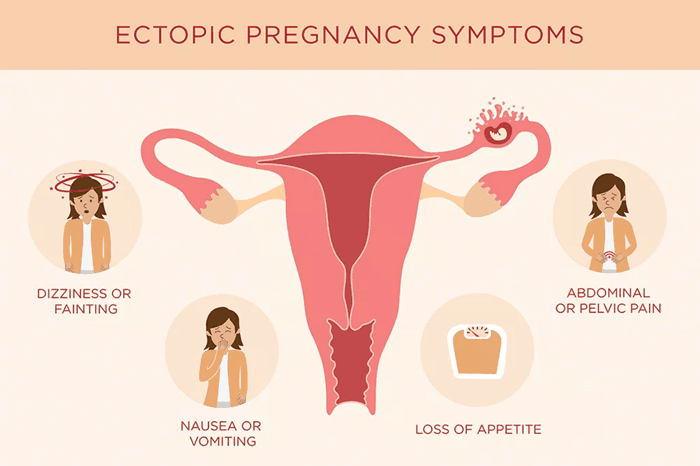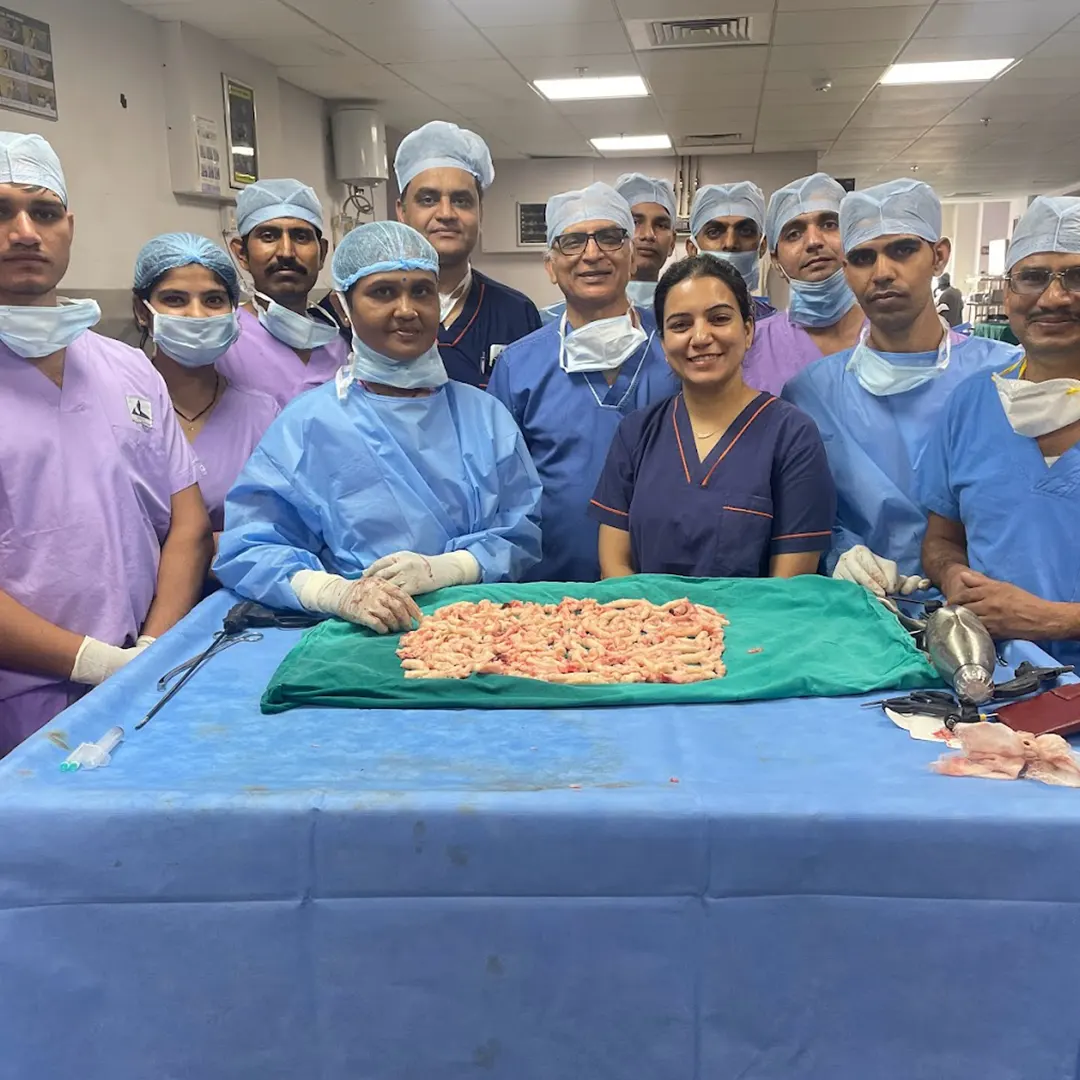An ectopic pregnancy is a pregnancy that happens outside the uterus, around the fallopian tube. However, fallopian tubes aren’t made to hold a growing embryo. This condition can lead to excessive internal bleeding, which may also be life-threatening.
On average, the symptoms of ectopic pregnancy start reflecting in week 4 and become more prominent by week 6-9. Apart from the fallopian tube, ectopic pregnancy can also happen around the abdominal cavity or ovary. Studies show that 1-2% of pregnancies are ectopic and are often related to 5-10% of pregnancy-related deaths.
Having experience for almost years as one of the leading gynecologists in Jaipur, Dr. Pankhuri Gautam has treated numerous ectopic pregnancies. If you’re scared of suffering from this condition, I can help you overcome the challenges and treat you. For now, let’s look into all the important details of ectopic pregnancy.
Signs of Ectopic Pregnancy
Detecting the symptoms of ectopic pregnancy in the initial stages may not be possible. Women who have ectopic pregnancy are likely to experience the same symptoms as the early stages of pregnancy, like nausea, breast tenderness, and missed periods.
If you take a pregnancy test during pregnancy, the results are likely to come out positive, but you cannot continue with it because it may have certain negative implications as well. However, you may start noticing the symptoms prominently in the later stages because the egg will grow and implant itself in the wrong location.
Early Symptoms
The early signs of ectopic pregnancy include mild pelvic and abdominal pain accompanied by light vaginal bleeding. When the blood leaks from the fallopian tubes, you may experience pain around your shoulders or the urge for bowel movement. Either of these can happen depending on where the blood leaks and gets collected.
Emergency Symptoms
If the implantation happens in the fallopian tubes, the embryo will continue growing, leading to rupture. Thus, you may experience internal uterine bleeding around the abdomen. If you’re not paying attention to these symptoms, these can turn out to be life-threatening, thereby leading to fainting, shock and even light-headedness.
What are the Causes of Ectopic Pregnancy?
- The main cause of ectopic pregnancy isn’t always determined easily. Several factors can contribute to ectopic pregnancy. Some of the major conditions that may be linked to ectopic pregnancy are as follows:
- Genetic abnormalities
- Hormonal fluctuations
- Inflammation or any scar in the fallopian tubes or reproductive organs from previous surgery
- Existing medical conditions may affect the condition and shape of fallopian tubes and reproductive organs.
Note: The causes of ectopic pregnancy will vary significantly, and your doctor will be the best one to recommend what treatment to opt for.
When does Ectopic Pregnancy Occur?
An ectopic pregnancy occurs when the fertilized egg does not implant in the uterus but outside it, specifically in the fallopian tubes. In a normal pregnancy, the fertilized egg should travel down and implant in the uterus for further development. However, in ectopic pregnancy, the egg will implant itself along the way, mostly in the fallopian tubes. Around 90% of the ectopic pregnancies happen inside the fallopian tubes.
What are Complications of Ectopic Pregnancy?
Ectopic pregnancies can be life-threatening for pregnant women if it is left undiagnosed and not treated. However, it is essential to note that once you opt for ectopic pregnancy treatment, it will not save your pregnancy.
Some of the significant complications you’re likely to face in case of ectopic pregnancy include:
- Internal bleeding: Severe ectopic pregnancy can lead to heavy bleeding, which can further lead to shocking outcomes. If it is not addressed immediately, it can also increase reproductive organ damage.
- Damage to fallopian tubes: Fallopian tube damage can increase the difficulty levels of becoming pregnant normally. As a result, it may prevent the fallopian tube from functioning normally.
If one of the fallopian tubes is damaged and removed after treatment, the chances of pregnancy in the future are high. However, if both the fallopian tubes are removed, then the couple may have to undergo IVF.
What are the Risks of Ectopic Pregnancy?
The following risk factors contribute to a higher risk of developing ectopic pregnancy:
- Anyone who has had a previous threat of ectopic pregnancy.
- A history of infection around the fallopian tube, ovaries, and uterus.
- Older people are at a higher risk of ectopic pregnancy.
- The damaged shape of the fallopian tube.
- History of previous surgery such as cesarean or fibroid treatment such as removal surgery.
- Sexually transmitted infections increase the risk of pelvic inflammatory disease, which in turn can increase the risk of ectopic pregnancy.
How is Ectopic Pregnancy Diagnosed?
It can be difficult to diagnose ectopic pregnancy in the early stages because the symptoms often reflect it to be an underlying medical condition. Your gynecologist will examine your condition and symptoms before conducting the transvaginal ultrasound. During the ultrasound, they may diagnose the condition and confirm the chances of pregnancy.
Under certain circumstances, when it’s too early to determine the chances of ectopic pregnancy, the doctor will run blood tests to monitor the condition. The tests may be continued until the doctor has confirmed or ruled out the chances of pregnancy.
Treatment of Ectopic Pregnancy
Many doctors consider ectopic pregnancy unsafe for the mother as the embryo won’t develop full term. Not removing the embryo soon can lead to fertility issues for the mother in the future. The treatment of ectopic pregnancy, however, often depends on the location of implantation.
Some of the potential treatment options for ectopic pregnancy are as follows:
Medicine
A professional gynecologist may prescribe medicines to help prevent the growth of cells in an ectopic mass. These medicines are usually injected, after which the doctor recommends blood tests. These medicines may induce symptoms similar to miscarriage, such as bleeding, cramping, and tissue passing.
If the medicine is taken in the early stages of ectopic pregnancy, the effects won’t be that severe. You wouldn’t need surgery as the medicine would solve the problem.
Surgery
In complex situations, the doctor will remove the embryo surgically and repair any internal damage. This is known as laparotomy. In this process, the doctor will insert a small camera to monitor their work through a small incision, remove the embryo, and repair any internal damages.
Owing to complex situations, the surgery may fail in the first attempt, after which it is repeated. The doctor may now make a larger incision to monitor the work and may altogether remove the fallopian tube if it has suffered severe or significant damage.
Prevention of Ectopic Pregnancy
It is important to note that prediction and prevention may not resolve the issues. Studies show that 0.91% of pregnancies are ectopic pregnancy and can occur in people without any risks. However, it is advisable to prevent risk factors like STIs and PID from leading to ectopic pregnancy.
If you’re a smoker, you should avoid smoking during your pregnancy or when you’re trying to conceive. Moreover, if you have had an ectopic pregnancy in the past, make sure to monitor the signs and symptoms when you’re trying again. If one of your fallopian tubes was removed during the surgery, it is advisable to be on birth control until your reproductive system is healthy enough to conceive. However, the removal of two tubes can lead to infertility, and you may have to opt for IVF.
Final Thoughts
Ectopic pregnancy can be scary and unexpected. However, it’s not uncommon. If you have an ectopic pregnancy, your hormonal imbalances will pave the way for a wide range of emotions. You must know it’s okay and treatable, so you must connect with the doctors. As expert gynecologists, we’re here for you. Ectopic pregnancy is not untreatable and will not make you infertile. If you follow a healthy lifestyle and address the challenges soon, overcoming the risks will never be a problem. If you feel that you have an ectopic pregnancy, schedule a consultation with us today!



